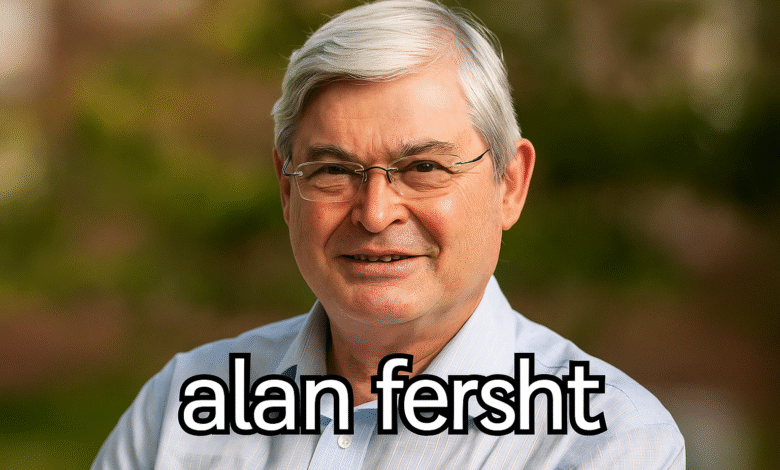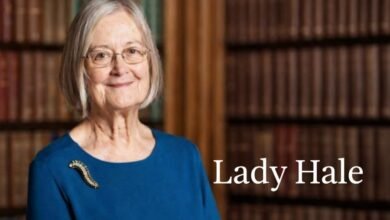Alan Fersht: The Genius Behind Modern Protein Engineering
A Visionary Scientist, Former Head of Gonville and Caius College, Cambridge Who Redefined Molecular Biology

Table of Contents
ToggleIntroduction
Sir Alan Fersht is a name that resonates powerfully within the world of biochemistry and molecular biology. As one of the most influential figures in the field of protein science, his groundbreaking contributions have reshaped how we understand the folding, function, and stability of proteins — the building blocks of life itself. Beyond his laboratory achievements, Alan Fersht also served as the Head of College of the Gonville and Caius College, Cambridge, where he inspired generations of scholars and researchers to pursue excellence in science and academia.
Born in London in 1943, Fersht combined deep scientific intellect with tireless curiosity and leadership. His pioneering work in protein engineering opened a new era in molecular biology, blending chemistry, biology, and physics to unravel the complex nature of enzymes and proteins. His legacy extends far beyond the laboratory walls, touching medicine, education, and the global scientific community.
Quick Bio
| Field | Details |
|---|---|
| Full Name | Alan Roy Fersht |
| Date of Birth | 21 April 1943 |
| Age (as of 2025) | 82 years |
| Birthplace | Hackney, London, England |
| Nationality | British |
| Education | University of Cambridge (Natural Sciences, PhD in Chemistry) |
| Occupation | Biochemist, Molecular Biologist, Academic |
| Known For | Founding Protein Engineering |
| Notable Role | Head of Gonville and Caius College, Cambridge (2012–2018) |
| Marital Status | Married to Marilyn Persell |
| Children | One son and one daughter |
| Honours | Knight Bachelor (2003), Fellow of the Royal Society (FRS) |
Early Life and Education
Alan Fersht was born in Hackney, London, into a hardworking family of tailors and dressmakers. His upbringing instilled in him discipline, curiosity, and a relentless drive to understand how things work. From an early age, he displayed an exceptional aptitude for problem-solving, particularly in mathematics and science.
He attended Sir George Monoux Grammar School in Walthamstow, where his intellectual promise became evident. Awarded a State Scholarship, he entered Gonville and Caius College, University of Cambridge, to study Natural Sciences. Excelling in his studies, he earned First Class Honours and later completed his PhD in Chemistry in 1968 with a thesis on Intramolecular Catalysis of Ester Hydrolysis. This academic foundation laid the groundwork for a lifetime of scientific discovery.
Academic Career and Leadership
After his doctoral studies, Alan Fersht embarked on a postdoctoral fellowship at Brandeis University under the mentorship of Professor William Jencks. Returning to Cambridge in 1969, he joined the MRC Laboratory of Molecular Biology, one of the world’s leading centres for biochemistry research.
His rise in academia was swift and well-deserved. From 1978 to 1988, he served as Professor of Biological Chemistry at Imperial College London before returning to Cambridge as the Herchel Smith Professor of Organic Chemistry. Later, he became the Head of College of Gonville and Caius College, Cambridge, leading the institution from 2012 to 2018. Under his leadership, the college thrived academically, with renewed focus on scientific research and interdisciplinary collaboration.
Scientific Achievements and Contributions
Alan Fersht’s research fundamentally changed our understanding of protein folding — the process by which proteins achieve their functional three-dimensional shapes. He pioneered the field of protein engineering, using targeted mutations to study how changes in amino acid sequences affect structure and function.
He introduced the concept of the specificity constant (kcat/Km) in enzymology, which quantifies enzyme efficiency — a cornerstone of modern biochemistry. His most notable scientific innovation, Φ-value (phi-value) analysis, allowed scientists to probe the structure of transition states during protein folding. This approach revealed how proteins navigate their complex energy landscapes to reach their functional forms, bridging chemistry, physics, and biology in one elegant framework.
Role as Head of Gonville and Caius College, Cambridge
As Head of College of the Gonville and Caius College, Cambridge, Fersht combined administrative wisdom with his scientific acumen. He promoted innovation, diversity, and academic excellence, ensuring that the college remained a hub of intellectual brilliance.
During his tenure, he emphasized the importance of scientific literacy across disciplines and mentored numerous young researchers who have since become leaders in academia and industry. His tenure is remembered for fostering collaboration between the humanities and sciences — a balance that strengthened the college’s academic fabric.
Awards and Recognition
Sir Alan Fersht’s list of honours is a testament to his extraordinary impact. Elected as a Fellow of the Royal Society (FRS) in 1983, he has received several of the society’s most prestigious awards, including the Gabor Medal (1991), Davy Medal (1998), Royal Medal (2008), and the Copley Medal (2020) — the oldest and most distinguished scientific award in the world.
He was knighted in 2003 for his pioneering contributions to protein science, cementing his place among the greatest scientists of his generation. His achievements continue to inspire countless researchers who build upon his foundational work in protein folding and enzymology.
Publications and Influence
Alan Fersht is not only a brilliant experimentalist but also an exceptional communicator. His seminal textbook, Structure and Mechanism in Protein Science, is considered a cornerstone of biochemical education, bridging complex theory and experimental practice.
Through his books, lectures, and mentorship, he has shaped how modern science understands proteins — from enzymatic catalysis to folding mechanisms. His research continues to guide studies into diseases caused by protein misfolding, such as Alzheimer’s and cancer, especially through his work on the p53 tumour-suppressor protein.
Legacy and Impact
Sir Alan Fersht’s legacy lies not only in his discoveries but in the culture of excellence he cultivated. As a scientist, educator, and former Head of Gonville and Caius College, Cambridge, he exemplified the spirit of curiosity and collaboration that defines world-class science.
His pioneering efforts in protein engineering opened new pathways for drug discovery, structural biology, and molecular medicine. Generations of biochemists continue to rely on his methods, theories, and mentorship. His balanced approach — combining rigorous scientific inquiry with human understanding — has made him an enduring figure in modern biology.
Conclusion
Alan Fersht’s life reflects the power of intellect, dedication, and scientific vision. From his humble beginnings in London to becoming a knighted Fellow of the Royal Society and Head of College at Cambridge, his journey illustrates how determination and curiosity can transform the world of science.
His achievements stand as a beacon of progress — proving that one individual’s pursuit of knowledge can unlock the secrets of life itself. Sir Alan Fersht’s story continues to inspire scientists and students worldwide, ensuring that his impact will resonate for generations to come.
Frequently Asked Questions (FAQ)
Who is Alan Fersht?
Alan Fersht is a British biochemist and molecular biologist, recognized as the founder of modern protein engineering and a leading figure in the study of protein folding and enzyme catalysis.
What was Alan Fersht’s role at Cambridge?
He served as the Head of College of the Gonville and Caius College, Cambridge from 2012 to 2018, guiding the college toward greater academic excellence and interdisciplinary collaboration.
What is Alan Fersht best known for?
He is best known for developing protein engineering techniques, introducing Φ-value analysis, and pioneering studies on enzyme kinetics and protein folding.
What awards has Alan Fersht received?
He has been honoured with numerous awards, including the Copley Medal, Royal Medal, Davy Medal, and Gabor Medal, and was knighted in 2003.
What is Alan Fersht’s legacy?
His legacy lies in revolutionizing protein science, shaping modern biochemistry education, and mentoring future leaders in molecular biology.




